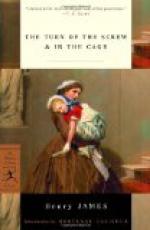one’s fate infallibly declared itself in absolute
indifference to them at about eight-fifteen.
Remarks were remarks, and very well for that; but fate
was fate, and this young lady’s was to pass
Park Chambers every night in the working week.
Out of the immensity of her knowledge of the life of
the world there bloomed on these occasions as specific
remembrance that it was regarded in that region, in
August and September, as rather pleasant just to be
caught for something or other in passing through town.
Somebody was always passing and somebody might catch
somebody else. It was in full cognisance of
this subtle law that she adhered to the most ridiculous
circuit she could have made to get home. One
warm dull featureless Friday, when an accident had
made her start from Cocker’s a little later
than usual, she became aware that something of which
the infinite possibilities had for so long peopled
her dreams was at last prodigiously upon her, though
the perfection in which the conditions happened to
present it was almost rich enough to be but the positive
creation of a dream. She saw, straight before
her, like a vista painted in a picture, the empty
street and the lamps that burned pale in the dusk not
yet established. It was into the convenience
of this quiet twilight that a gentleman on the doorstep
of the Chambers gazed with a vagueness that our young
lady’s little figure violently trembled, in the
approach, with the measure of its power to dissipate.
Everything indeed grew in a flash terrific and distinct;
her old uncertainties fell away from her, and, since
she was so familiar with fate, she felt as if the very
nail that fixed it were driven in by the hard look
with which, for a moment, Captain Everard awaited
her.
The vestibule was open behind him and the porter as
absent as on the day she had peeped in; he had just
come out—was in town, in a tweed suit and
a pot hat, but between two journeys—duly
bored over his evening and at a loss what to do with
it. Then it was that she was glad she had never
met him in that way before: she reaped with such
ecstasy the benefit of his not being able to think
she passed often. She jumped in two seconds to
the determination that he should even suppose it to
be the very first time and the very oddest chance:
this was while she still wondered if he would identify
or notice her. His original attention had not,
she instinctively knew, been for the young woman at
Cocker’s; it had only been for any young woman
who might advance to the tune of her not troubling
the quiet air, and in fact the poetic hour, with ugliness.
Ah but then, and just as she had reached the door,
came his second observation, a long light reach with
which, visibly and quite amusedly, he recalled and
placed her. They were on different sides, but
the street, narrow and still, had only made more of
a stage for the small momentary drama. It was
not over, besides, it was far from over, even on his
sending across the way, with the pleasantest laugh
she had ever heard, a little lift of his hat and an
“Oh good evening!” It was still less
over on their meeting, the next minute, though rather
indirectly and awkwardly, in the middle, of the road—a
situation to which three or four steps of her own
had unmistakeably contributed—and then passing
not again to the side on which she had arrived, but
back toward the portal of Park Chambers.




